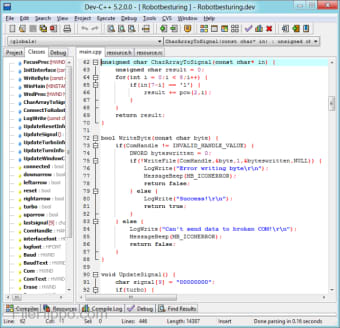Dev C++ Standard 11
| Language | ||||
| Standard Library Headers | ||||
| Freestanding and hosted implementations | ||||
| Named requirements | ||||
| Language support library | ||||
| Concepts library(C++20) | ||||
| Diagnostics library | ||||
| Utilities library | ||||
| Strings library | ||||
| Containers library | ||||
| Iterators library | ||||
| Ranges library(C++20) | ||||
| Algorithms library | ||||
| Numerics library | ||||
| Input/output library | ||||
| Localizations library | ||||
| Regular expressions library(C++11) | ||||
| Atomic operations library(C++11) | ||||
| Thread support library(C++11) | ||||
| Filesystem library(C++17) | ||||
| Technical Specifications |
C11 is a version of the standard for the programming language C.It was approved by International Organization for Standardization (ISO) on 12 August 2011, replacing C03, superseded by C14 on 18 August 2014 and later, by C17. Jan 20, 2020 Dev C v5.11 GCC v4.9.2 is a feature-rich IDE, which comes complete with a compiler to create software in C. Is a fork of the original Bloodshed Dev-C environment. Apr 27, 2015 Dev-C is looking for translators, because the author doesn't master all thirty languages Dev-C is (partially) translated in. So, if you're willing to translate Dev-C into a language or update the existing translation, don't hesitate to open up YourLanguage.lng and start translating/updating, using English.lng as the reference language. Apr 01, 2016 Bloodshed Dev-C is a full-featured Integrated Development Environment (IDE) for the C/C programming language. It uses Mingw port of GCC (GNU Compiler Collection) as it's compiler. Dev-C can also be used in combination with Cygwin or any other GCC based compiler. The default setting that Orwell Dev-C uses (don't pass any -std option), will not enable some shiny new C11 functions, like uniqueptr. The fix is quite simple: For non-project compilations, go to: Tools Compiler Options (select your compiler) Settings Code Generation (set 'Language standard' to a. Dev-C 5.11 Features. Dev-C utilizes MinGW which is a port of GCC (GNU Compiler Collection) for GNU Binary Utilities. You can add additional content to the software like different libraries in order to expand its possibilities.
Statements| Labels | ||||
| label : statement | ||||
| Expression statements | ||||
| expression ; | ||||
| Compound statements | ||||
| { statement.. } | ||||
| Selection statements | ||||
| if | ||||
| switch | ||||
| Iteration statements | ||||
| while | ||||
| do-while | ||||
| for | ||||
| range for(C++11) | ||||
| Jump statements | ||||
| break | ||||
| continue | ||||
| return | ||||
| goto | ||||
| Declaration statements | ||||
| declaration ; | ||||
| Try blocks | ||||
| try compound-statementhandler-sequence | ||||
| Transactional memory | ||||
synchronized, atomic_commit, etc(TM TS) |

Transfers control to one of the several statements, depending on the value of a condition.
[edit]Syntax
attr(optional)switch(condition)statement | (until C++17) |
attr(optional)switch(init-statement(optional)condition)statement | (since C++17) |
| attr(C++11) | - | any number of attributes |
| condition | - | any expression of integral or enumeration type, or of a class type contextually implicitly convertible to an integral or enumeration type, or a declaration of a single non-array variable of such type with a brace-or-equals initializer. |
| init-statement(C++17) | - | either
|
| statement | - | any statement (typically a compound statement). case: and default: labels are permitted in statement and break; statement has special meaning. |
attr(optional)caseconstant_expression:statement | (1) |
attr(optional)default:statement | (2) |
| constant_expression | - | a constant expression of the same type as the type of condition after conversions and integral promotions |
[edit]Explanation
The body of a switch statement may have an arbitrary number of case: labels, as long as the values of all constant_expressions are unique (after conversions/promotions). At most one default: label may be present (although nested switch statements may use their own default: labels or have case: labels whose constants are identical to the ones used in the enclosing switch)
If condition evaluates to the value that is equal to the value of one of constant_expressions, then control is transferred to the statement that is labeled with that constant_expression.
If condition evaluates to the value that doesn't match any of the case: labels, and the default: label is present, control is transferred to the statement labeled with the default: label.
The break statement, when encountered in statement exits the switch statement:
Compilers may issue warnings on fallthrough (reaching the next case label without a break) unless the attribute If init-statement is used, the switch statement is equivalent to Serum download for fl studio.
Except that names declared by the init-statement (if init-statement is a declaration) and names declared by condition (if condition is a declaration) are in the same scope, which is also the scope of statement. | (since C++17) |
Because transfer of control is not permitted to enter the scope of a variable, if a declaration statement is encountered inside the statement, it has to be scoped in its own compound statement:
C++ Standard Pdf
[edit]Keywords
switch,case,default
[edit]Example
The following code shows several usage cases of the switch statement
Output:
[edit]See also
C documentation for switch |